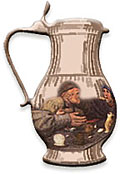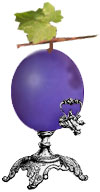|
Three hundred clusters and a barrel of wine:
Wine production from Second Temple to medieval times
Salo Baron
Grain, oil and wine: The altar and
the table of man
Nogah Hareuveni
Kiddush:
Sanctifying the day over a cup of wine:
An evolving tradition
Ismar Elbogen
 "I
drank and I was exhilarated": A first-hand medieval account
of Friday evening Jewish drinking customs in 15th-century Alexandria "I
drank and I was exhilarated": A first-hand medieval account
of Friday evening Jewish drinking customs in 15th-century Alexandria
Ovadiah of Bertinoro
Satan and Noah planted a vineyard: The origin of
viticulture according to the midrash
 Kichlot
yeni: When my wine is finished Kichlot
yeni: When my wine is finished
A medieval poem and a historical recording of it set to a folk melody
of unknown origin
Solomon Ibn Gabirol
 Two
sides of the flagon: Rabbinic attitudes towards wine drinking Two
sides of the flagon: Rabbinic attitudes towards wine drinking
Seventy is seventy is seventy: A cautionary
Talmudic tale told in numbers
Italian wine in early rabbinic times: Luxury
import or liquid measure
Gedalia Alon
Chlavne, who always loved a drink: A wine story
by the greatest story teller
Sholom Aleichem
White, red, burnt, live, old, sweet, dry, sour:
A Hebrew lesson: Wine (yayin)
Four cups of wine or five
at the Passover seder? (When Elijah comes, we will know the answer...)
Shoshana Michael Zucker

The World-To-Come is not like this world. In this world one has
to trouble to harvest the grapes and press them; but in the World-To-Come
a person will bring a single grape in a wagon or a ship, store
it in the corner of his house, and draw from it enough wine to
fill a large flagon and its stalk will be used as fuel under the
pot. There will not be a grape which will not yield thirty measures
of wine. (TB Ketubbot 111b)
|
|



